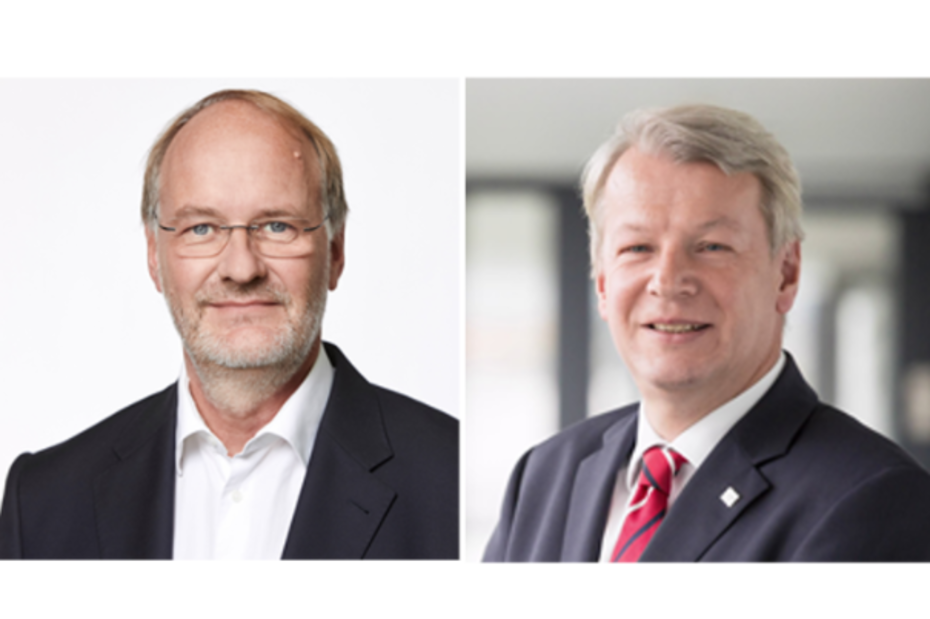3 questions for Peter Liggesmeyer and Harald Schöning about updating the “Themenfelder Industrie 4.0”

© Harald Schöning: © Software AG; Peter Liggesmeyer: © Fraunhofer
Munich, 06 September 2022
1. What are the most pressing research and development needs that will arise in the next few years and should be particularly supported?
P. Liggesmeyer:
In the next few years it will be important to implement the technical foundations that have been created in the best possible way. This particularly affects small and medium-sized companies. A focus of research will be the penetration of complicated, networked production processes. This concerns the understanding of new business models, but also the ability to evaluate sustainability and resilience aspects.
H. Schöning:
Significant pioneering work has been done over the last 10 years, so that with the support of BMBF & BMWK the technological and conceptual foundation for Industrie 4.0 has been laid. Now the main thing is to bring the developed technologies and concepts into widespread use. However, this does not mean that there is no longer any need for research and development, which is necessary in addition to the focus on transfer/adaptation of the (basic) research results. National monitoring of Industrie 4.0 should be established here so that it becomes transparent where Germany stands in terms of the implementation of Industrie 4.0 in the economy – also in international comparison.
In order to make further R&D needs tangible, the Research Council has developed the interdisciplinary “Key Themes of Industrie 4.0”. The respective research and development needs can be found under the four headings “Economic Change in Value Creation”, “Prospects for Technological Development”, “Engineering of Industrie 4.0 Solutions” and “Work, Companies and Society”. These all contribute to the overall societal goals of sustainability, sovereignty and securing Germany as a location and contribute to solving current challenges, e.g. reducing greenhouse gas emissions, reducing dependencies on non-European raw material suppliers and economic resilience.
2. What acute recommendations for action can be derived briefly and concisely for politicians to implement digital strategies in practice?
P. Liggesmeyer:
First of all, it is important that politicians also understand that Industrie 4.0 is something that cannot be implemented within a few years. Industrie 4.0 requires ongoing, systematic support from politics. The focus should be on removing barriers to innovation.
H. Schöning:
Due to current circumstances, I will mention the topic of legislation and regulation (at national and European level) first. Regulations that once made sense in the past and their interpretations must be put to the test, because today they prevent, for example, the flexible use of renewable energies, the use and legally secure use of non-personal machine data. New regulations that are currently being issued at a high frequency at the EU level are causing collateral damage because they are not limited precisely enough to the intended goals. A truly comprehensive impact assessment must take place here, involving all stakeholders. A “regulatory reflection” would be appropriate. For the occasionally expressed view that regulation brings about innovation, there is, in my opinion, no empirical evidence.
The second point for me is that politics sets a shining example and becomes a pioneer of digitalisation. At the moment, however, we can rather hope that we will not fall further behind in international comparison when it comes to e-government.
Ultimately, testing and research into digitalisation in innovative areas must continue to be supported by politics. It should always be borne in mind that Industrie 4.0 means a profound structural change that – like the three other economic revolutions before it – will last for many years, which is why politics here also needs patience.
3. How can the sustainability goals be achieved using Industrie 4.0 technologies?
P. Liggesmeyer:
Many features of Industrie 4.0 contribute to sustainability. For example, a precise understanding of production processes allows them to be optimised with regard to energy and raw material consumption. In addition, the systematic implementation of a functioning circular economy is supported.
H. Schöning:
Industrie 4.0 can contribute to various sustainability goals, e.g. reducing energy consumption by consistently optimising the entire value chain across supply chains. A holistic view is required – from the production of intermediate products to logistics to adapting production to the current supply of electricity from renewable energies – this can only be achieved using Industrie 4.0. Another example is the saving of raw materials by increasing the degree of collection in the circular economy and the quality of the recovered raw materials. In addition to a corresponding product design, information on the ingredients and dismantling of products over their entire life cycle is required – a topic that is addressed by Industrie 4.0, for example through the digital product passport. Digital business models, such as those made possible by Industrie 4.0, can also make an important contribution to sustainability.
If the value creation shifts from the production of a product to services for this product, fewer resources are required for the same value creation. This creates an incentive for the industry to produce longer-lasting or more flexible products. Saving material and avoiding rejects can also be achieved through real-time quality control or even quality forecasting. Industrie 4.0 also includes looking at people right from the start. This includes, for example, the design of human-machine interaction that is aimed at people. Collaborative robots are just one example. And finally, it’s also about economic sustainability: if we want to keep production in Germany and secure jobs sustainably, then there is no way around Industrie 4.0.
The publication of the Research Council Industrie 4.0 „Themenfelder Industrie 4.0
(2. überarbeitete Fassung)“ can be found here (in German).

